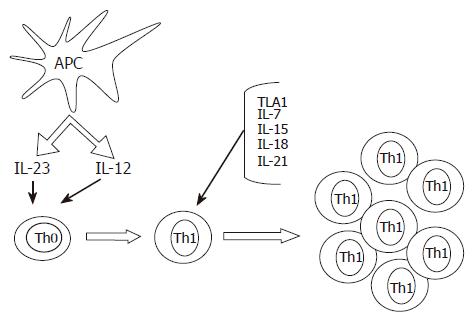Copyright
©2006 Baishideng Publishing Group Co.
World J Gastroenterol. Sep 21, 2006; 12(35): 5606-5610
Published online Sep 21, 2006. doi: 10.3748/wjg.v12.i35.5606
Published online Sep 21, 2006. doi: 10.3748/wjg.v12.i35.5606
Figure 1 Some putative mechanisms implicated in the induction and expansion of Th1 cells in the gut of patients with Crohn’s disease.
Cytokines produced by antigen presenting cells, such as IL-23 and IL-12, promote the differentiation of Th1 cells. The expansion and mucosal accumulation of this cell subtype are then sustained by additional molecules, such as IL-18, IL-7, IL-15, IL-21 and TL1A.
- Citation: Peluso I, Pallone F, Monteleone G. Interleukin-12 and Th1 immune response in Crohn’s disease: Pathogenetic relevance and therapeutic inplication. World J Gastroenterol 2006; 12(35): 5606-5610
- URL: https://www.wjgnet.com/1007-9327/full/v12/i35/5606.htm
- DOI: https://dx.doi.org/10.3748/wjg.v12.i35.5606









